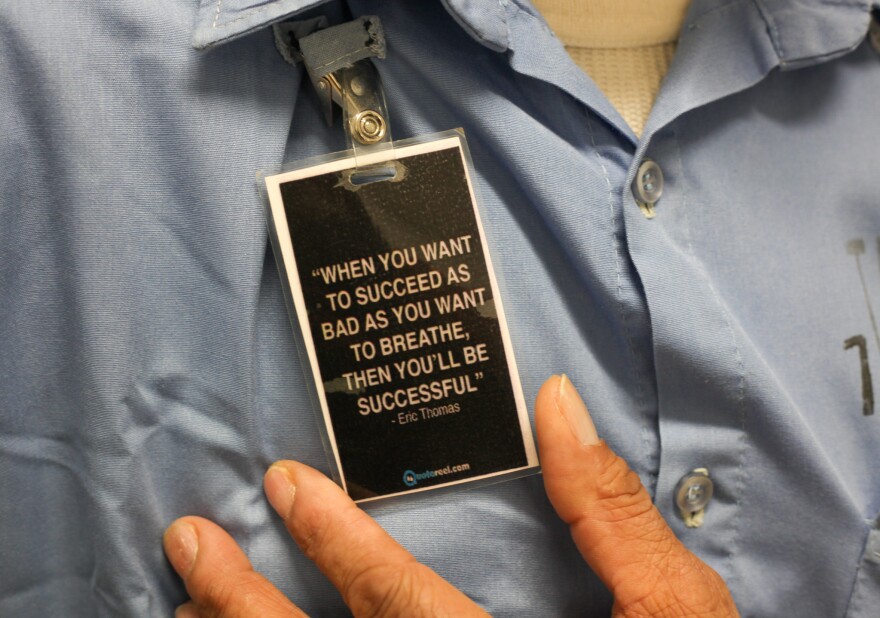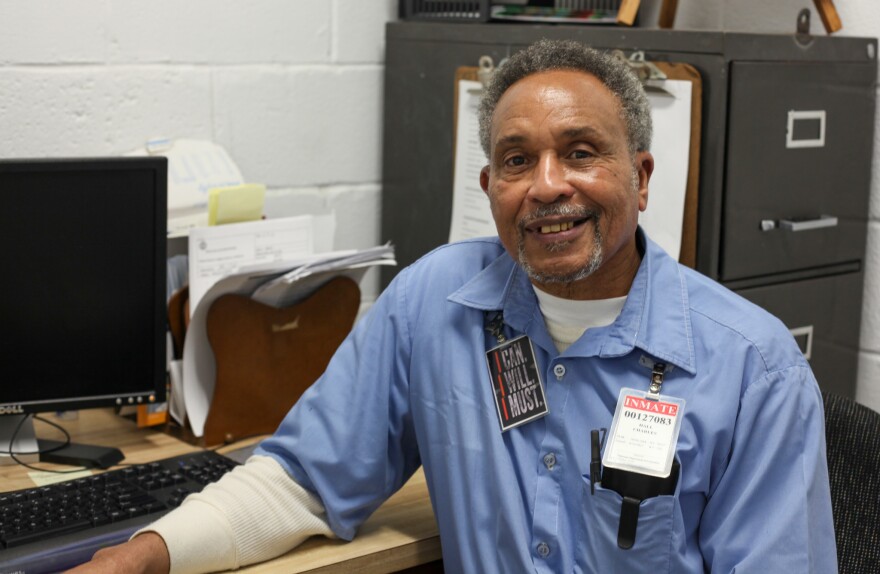In the often busy property room at the Northwest Correctional Complex in Tiptonville—two hours north of Memphis—the state prison stores and distributes items inmates need such as shirts, pants, socks and blankets.
Those on their way home at the end of their sentences also stop here for a change of clothes.
This gives inmate Charles Hall, who works in the room, an opportunity to offer some final words of encouragement, especially to the younger ones on the cusp of freedom.
“I just try to instill in them to be responsible,” he says. “I am big on respect because respect has really got me where I am today.”
Now, Hall may get a chance to change out of his own prison-issued uniform—an ending to his story never outlined by the criminal justice system. The 73-year-old Memphis man was meant to die in prison. In 2005, he received two life sentences without parole under Tennessee’s so-called three strikes law for a set of armed robberies.
God, he says, had other plans.
“The computer said life without parole, but God didn’t have that on his computer,” he says during a recent sit down interview.

At the end of last year, Gov. Bill Lee used his powers of executive clemency for the first time since taking office in 2019. Hall is one of just three people whose sentences were commuted—or in some way reduced—by the governor. One person received a full exoneration, which recognizes innocence of a crime. Another 13 individuals obtained pardons, which serve as a declaration of forgiveness for those who have already completed their sentences.
Hall’s commutation makes him eligible for parole. He goes before the state’s board on March 8.
“I just kept hope alive” he says, offering effusive gratitude for his new circumstances. “I really didn’t expect to get this far, but I did.”
Hall is tall and relatively healthy for his age. He’s gregarious and, as described by prison staff, unfailingly polite. His disciplinary record only contains two minor infractions.
He’s also known for his persistence, which has served him well. His first application for clemency, submitted during former Gov. Bill Haslam’s time in office, was turned down.
With a criminal record of theft that dates back to his teens, Hall has done multiple stints behind bars. In total, he says he’s spent more than half his life incarcerated.
His crimes never resulted in physical violence, but he expresses earnest remorse and empathy for the pain he’s caused his victims, including a Memphis woman whose car and money he stole while out on parole.
“I was sorry for what I did. I didn’t have no right to rob that lady,” Hall says. “I mean, you know, to deprive somebody of the idea of just…being safe. That woman wasn’t bothering anybody.”
He apologized to a victim who spoke out against him during his first commutation hearing.
Hall says he’s a changed man, but that his past crimes were driven by trauma and anger. In handwritten notes in his clemency file, Hall details a childhood marred by adults struggling with alcoholism, witnessing his grandmother shoot his grandfather and brutal treatment as a juvenile in detention.
As part of his parole eligibility, he had to complete a cognitive behavioral skills course, in addition to other self-development programs he sought out while incarcerated. He believes he’s better equipped now for what’s ahead should he become a free man.

“I can apologize for my past all day,” Hall says. “But my past is what got me to this point, to come to the realization of the things that I did and try to help somebody else.”
Angie Aguila, a correctional counselor who has supervised Hall, says he takes his commitment to helping seriously. At one point, he worked as a program mentor for 18-25 year-old inmates. But even now, Aguila says he shares his story and background to spur others to examine their choices.
“He has reached out to the younger ones in here, who are more resistant to change, and he has been responsible to the goal of bettering people, not just doing something for himself,” she says. “So I have a good deal of respect for him.”
That respect prompted Aguila to do something she’s only done three times in her nine-year corrections career. She wrote a letter to Gov. Lee on Hall’s behalf asking for clemency. Several other prison staff members also sent letters of recommendation. One was co-signed by 112 officers and personnel. It argued, in part, that an essential tenet of rehabilitation is the hope of release.
“He does possess the skills to…go out there and to do what’s right and to be right in his actions,” Aguila says.
Executive clemency is rare in Tennessee, and applications undergo a lengthy review process. First, the state’s Board of Parole screens them, selecting some for in-person hearings. The board then makes a non-binding recommendation to the governor.
Out of more than 1,000 commutation applications submitted since Lee took office, roughly 800 have met the criteria for clemency. Of those, only 32 so far have received a recommendation and been forwarded to Gov. Lee for his consideration. He’s signed off on three—including Hall’s. Some 500 are still under review.

Still, Nashville attorney Ben Raybin says Lee’s recent round of clemencies have set a promising precedent as it’s unusual for a governor to use this power during a first term. Neither former Govs. Haslam nor Phil Bredesen granted any until the end of their eight years in office.
“We can assume and extrapolate that there will be more to come, and therefore more [granted] than the previous governors as well,” says Raybin, who helps clients apply for clemency.
Hall is still adjusting to his own prospects. He starts to get emotional expressing his appreciation not only for the governor but also the support from prison staff he’s received. As his parole hearing approaches, he’s trying not to get too far ahead of himself.
“I still got a lot of thinking to do, a lot of planning to do,” he says. “But, I’m going to take it one step at a time, one day at a time.”
Although, he’s also letting himself envision what could be a new normal.
“I thought about it the other night,” he says. “I wished I could just get up and fix me some fried chicken and some candied yams. I can fix some candied yams.”
Also, he’d like to fish, visit St. Jude Children’s Research Hospital, train service dogs and keep sharing his story, hoping it might impact others.
“I want to take the rest of my life giving back because of all that I took,” he says.



